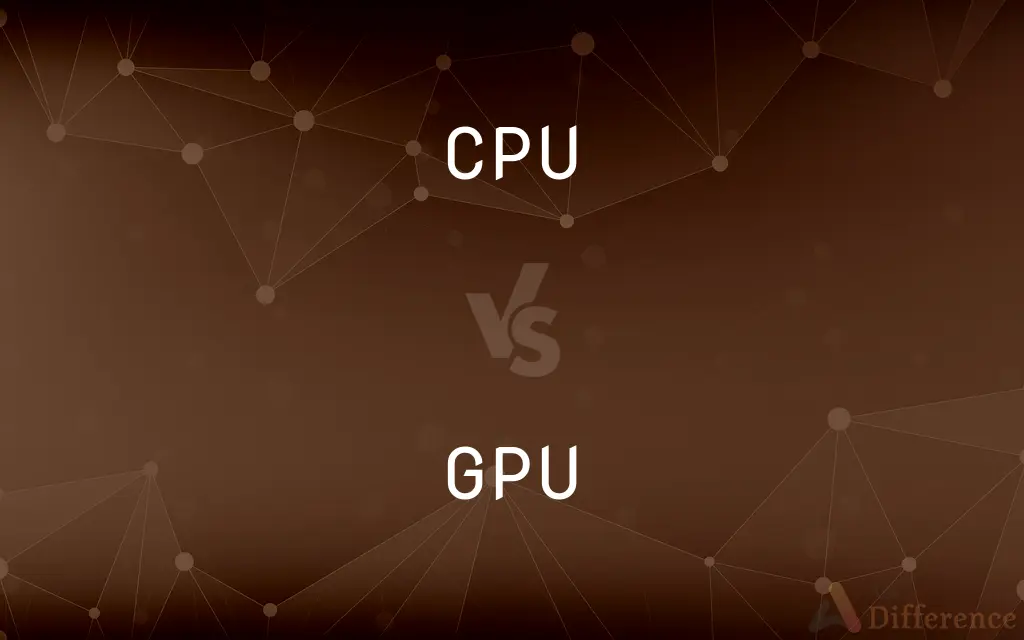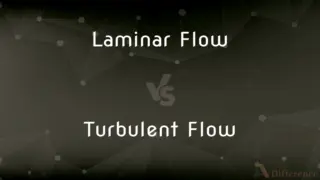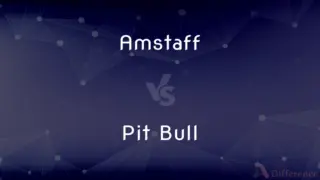CPU vs. GPU — What's the Difference?
By Maham Liaqat & Fiza Rafique — Published on August 2, 2024
CPU is the primary component of a computer that executes instructions and processes data. GPU specializes in rendering graphics and parallel processing, excelling in tasks requiring simultaneous computations.

Difference Between CPU and GPU
Table of Contents
ADVERTISEMENT
Key Differences
The CPU, often referred to as the "brain" of the computer, handles a wide range of tasks, including arithmetic, control, logic, and input/output (I/O) operations. It operates on a few cores with high clock speeds, optimizing for sequential processing and the efficient execution of a series of operations. This makes the CPU adept at handling general-purpose computing tasks, from running applications to performing system operations. In contrast, the GPU is designed to process multiple tasks simultaneously, leveraging its architecture composed of hundreds or thousands of smaller cores. These cores work together to perform complex mathematical calculations rapidly, particularly for rendering images, video processing, and other tasks that can be broken down into parallel operations.
While CPUs are essential for the overall functioning and performance of a computer, handling tasks that require decision-making and versatility, GPUs complement this by taking on computationally intensive tasks that can benefit from parallel processing. This division of labor allows for more efficient data processing, enhancing performance in tasks like 3D rendering, video editing, and running complex simulations.
The difference in architecture between CPUs and GPUs also reflects their specialized functions. CPUs with fewer, more powerful cores are optimized for sequential processing and quick execution of a diverse set of tasks. GPUs, with their many cores, are better suited for tasks that can be divided into smaller operations performed simultaneously, exploiting their parallel processing strengths.
In recent years, the role of GPUs has expanded beyond just graphics processing. They are increasingly used in data centers, scientific research, and for powering AI and machine learning algorithms, highlighting their importance in processing large datasets and performing complex computations efficiently.
The choice between a CPU and GPU for specific tasks depends on the nature of the task itself. For general computing and tasks requiring complex decision-making or varied sequential processing, the CPU is indispensable. For graphics rendering, video processing, and calculations that can be parallelized, the GPU offers superior performance.
ADVERTISEMENT
Comparison Chart
Core Function
Executes general-purpose computing tasks.
Specializes in parallel processing for graphics and data-intensive computations.
Architecture
Fewer cores with high clock speeds.
Hundreds to thousands of smaller cores designed for parallel processing.
Primary Use
Running applications, system operations, and performing a wide range of tasks.
Rendering images, video processing, and scientific computing.
Processing Type
Optimized for sequential processing.
Optimized for parallel processing of complex calculations.
Role in Computing
Essential for overall system performance and executing a variety of tasks.
Complements CPU by handling data-intensive tasks that benefit from parallelism.
Compare with Definitions
CPU
The main processor for executing instructions and handling system tasks.
The Intel Core i7 powers complex software applications.
GPU
Complements the CPU by offloading specific computational tasks.
Managing real-time graphics rendering in video games.
CPU
Optimized for tasks requiring decision-making and versatility.
Managing the operating system and user applications.
GPU
Contains many cores for simultaneous calculations.
Accelerating video editing and content creation workflows.
CPU
Features fewer, more powerful cores for efficient sequential processing.
Quickly processing tasks in a web browser.
GPU
Designed for rendering graphics and parallel processing.
NVIDIA GeForce GPUs enhance gaming and 3D rendering.
CPU
Handles a broad spectrum of computing needs.
From simple calculations to complex programming environments.
GPU
Increasingly used in AI, scientific research, and data analysis.
Powering complex neural networks for deep learning.
CPU
Vital for general computing and running applications.
Facilitating multitasking with various software programs.
GPU
Excels in tasks that can be divided into parallel operations.
Speeding up machine learning and scientific simulations.
CPU
The central processing unit, that part of the electronic circuitry of a computer in which the arithmetic and logical operations are performed on input data, which are thereby converted to output data; it is usually located on the mainboard, or motherboard, of a computer. The CPU and the memory form the central part of a computer to which the peripherals are attached. Most personal computers as of 1998 had only one CPU, but some computers may have more than one CPU.
CPU
(computer science) the part of a computer (a microprocessor chip) that does most of the data processing; the CPU and the memory form the central part of a computer to which the peripherals are attached
Common Curiosities
Is it possible to use a GPU for general computing tasks?
While GPUs are specialized for parallel processing, modern programming frameworks allow them to perform general computing tasks, especially those that can benefit from parallel processing, but they cannot replace CPUs for overall system management.
How do CPUs and GPUs work together?
In a computer system, the CPU handles general computing tasks, system management, and decision-making, while the GPU takes on specific tasks like graphics rendering and data-intensive computations that can leverage its parallel processing capabilities.
How does the number of cores in a CPU and GPU differ?
CPUs typically have fewer but more powerful cores optimized for sequential processing, while GPUs have hundreds to thousands of smaller cores designed for parallel tasks.
What is more important for gaming, a CPU or a GPU?
Both are important, but the GPU generally has a greater impact on graphical performance and frame rates in gaming. However, a sufficiently powerful CPU is also necessary to handle the game logic and prevent bottlenecks.
Can a computer function without a CPU?
No, the CPU is essential for the computer's operation, executing instructions, and managing system tasks.
What advancements are being made in CPU and GPU technology?
Advances include increases in core counts, efficiency improvements, integration of AI processing capabilities, and enhancements in semiconductor technology to boost performance and reduce power consumption.
Why can't a CPU perform as well as a GPU in graphics rendering?
A CPU's architecture is optimized for a wide range of tasks and not specifically for parallel processing, making it less efficient than a GPU for graphics rendering which requires simultaneous processing of numerous operations.
Why are GPUs becoming important in AI and machine learning?
The parallel processing ability of GPUs makes them exceptionally good at handling the large and complex calculations required in AI and machine learning algorithms, significantly speeding up processing times compared to CPUs.
Can I upgrade my computer's GPU to improve performance?
Yes, upgrading the GPU can significantly improve performance in tasks like gaming, video editing, and 3D modeling, provided the system's CPU and other components do not bottleneck its capabilities.
Are there tasks that only a CPU or GPU can perform?
While each is optimized for different types of tasks, there's an increasing overlap in capabilities. However, CPUs are essential for system operation and general-purpose computing, while GPUs are specialized for tasks requiring parallel processing.
Share Your Discovery

Previous Comparison
Laminar Flow vs. Turbulent Flow
Next Comparison
Amstaff vs. Pit BullAuthor Spotlight
Written by
Maham LiaqatCo-written by
Fiza RafiqueFiza Rafique is a skilled content writer at AskDifference.com, where she meticulously refines and enhances written pieces. Drawing from her vast editorial expertise, Fiza ensures clarity, accuracy, and precision in every article. Passionate about language, she continually seeks to elevate the quality of content for readers worldwide.













































